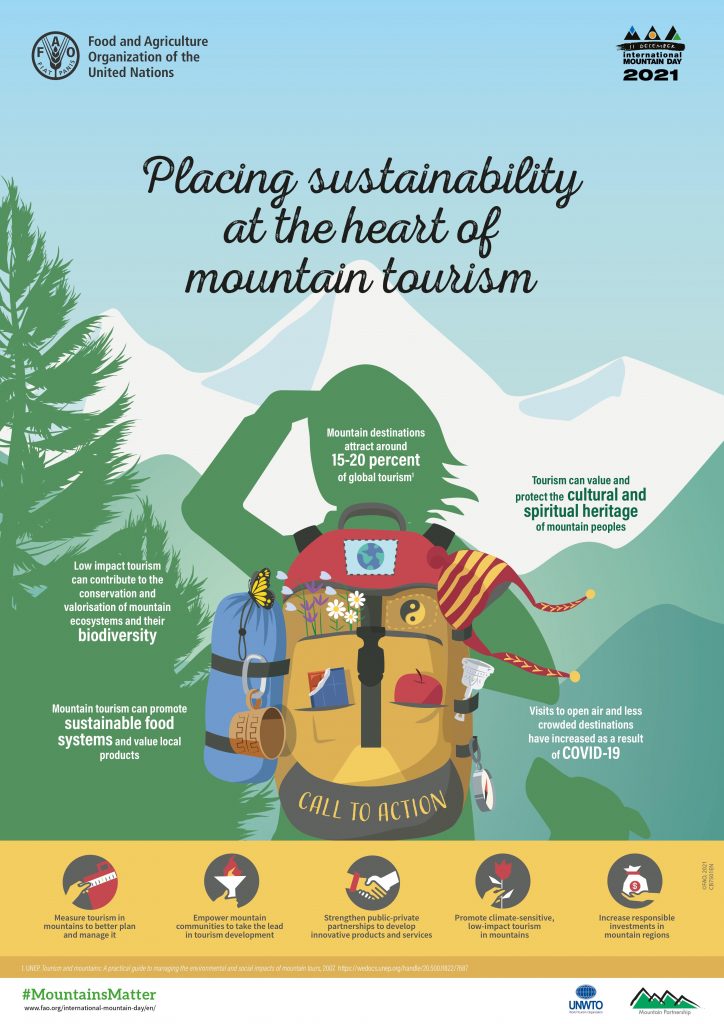Close your eyes and imagine steep slopes and unique landscapes with tall, dense forests or green grasslands stretched out for miles. Rich wildlife with an unmatched beauty that makes you catch your breath every time you blink your eyes. Ancient history, significant heritage in every rock on the ground. Every bend on the winding roads with a story of its own. People with warm smiles from diverse cultures and local traditions. The sound of rushing water in the background from a waterfall or a river nearby. Every inspiration, filling your lungs with clean and fresh air untouched by the smoke, dust, and pollution that plagues the cities. And finally, the feeling of complete and utmost tranquility and peace where time stands still and all your problems fade away.
Did you hear that? The mountains are calling…
Why Celebrate Mountains?
From the ice-capped crests of the majestic Himalayas to the dry and sandy Desert Mountains in Nevada, the tropical peaks of Puncak Jayathe in Indonesia to the volcanic beauty of Mount Fuji, mountains are some of the most captivating landscapes of the world, covering almost 24 percent of the earth’s land surface and providing a home to approximately 15 percent of the world’s population. They constitute half of the world’s biodiversity hotspots due to their dramatic shifts in altitude, habitat, weather, vegetation, and wildlife. Mountains also provide freshwater to half of the total population on earth every day and provide livelihood and income for the communities that live there through agriculture and tourism.

However, like all other ecosystems, these spectacular landscapes are also severely affected by climate change and overexploitation. The melting of ice glaciers on the peaks of mountains due to global warming disturbs the entire supply of water downstream. Global warming also affects the lives of the mountain people, who already are some of the world’s poorest people, with food shortage and poverty. Activities like bad agricultural practices, commercial mining, felling of trees, poaching, and pollution also have major impacts on the mountain ecosystem and biodiversity.
Day of Mountains… a Holiday?
In order to highlight the importance of mountains to life and call attention to the opportunities and constraints in mountain development and to build alliances that will bring positive change to mountain peoples and places around the world, The United Nations designated the 11th of December as the “International Mountain Day”, and it has been celebrated every year since 2003.
This day has been celebrated as one where people are inspired to understand and appreciate these jewels of nature, discuss their fragility, devise ways to protect the ecosystem along with its fauna and flora, and provoke governments and organizations to launch policies and guidelines that would help save the mountains. The people of Japan celebrate Mountain Day also known as ‘Yama no hi’ on the 11th of August. This holiday was established as a public holiday after the Japanese Alpine Club and other groups argued that Japan, where Shinto beliefs in nature have shaped the culture, should celebrate its peaks and mountain.
Symbol of International Mountain Day
The logo of International Mountain Day is a combination of three equilateral triangles that represent mountains with a stripe under them. The first triangle contains a blue rhombus shape at the top representing ice or snow at the top of mountains. The second triangle consists of an orange circle inside it depicting the resources that a mined from the inside of mountains, and the final triangle contains a smaller green triangle that represents the crops that grow on mountains.

International Mountain Day 2021: Theme
Each year the United Nations provides a particular theme for International Mountain Day. Freshwater, peace, climate change, and biodiversity are some examples of the themes focused on in previous years. This year, the theme is Sustainable Mountain Tourism. Mountains are one of the most popular tourist attractions on the earth, second only to the coastal beaches. These constitute 20 percent of Global Tourism. A tour to the mountains encompasses several unique experiences like living in tents or camping vehicles, nature walks, trekking, rock climbing, and mountain biking when the weather is dry; cross country, downhill and glacier skiing, snowboarding or sledding in snowfall seasons; and water-based activities like canoeing, rafting, and kayaking.
The mountains also promise unique cuisines and places with cultural and historical significance and thus millions of people visit the mountains to spend their holidays, boosting the local economy and creating alternative livelihood options for the locals and thereby promoting poverty alleviation and social inclusion. Tourism also has major impacts on the mountain ecosystems, communities, and economies that need to be addressed and sorted out. Clearing of vegetation and soil erosion, removal of rare habitat, pollution, altering of critical landscapes, and wildlife relocation are some of the environmental impacts of tourism.
Tourism also has socio-cultural impacts like trouble from the large amounts of visitors, and exposure to and adoption of foreign traditions and lifestyles which threaten the unique culture, traditions, knowledge, and livelihoods of mountain people and communities. In addition, tourism also produces economic impacts that harm the local populations as the working conditions can be poor, and revenue can easily leak out of local economies to externally owned large companies. Also, tourism is one of the sectors most affected by the COVID-19 pandemic, which has had damaging effects on the livelihood of mountain communities that depend on tourism for their main income. The restrictions of the pandemic have further increased the vulnerabilities of the mountain communities.

This year on International Mountain Day, it is crucial that we work towards sustainably managing tourism in the mountains in order to prevent the degradation of the fragile mountain ecosystems and bring awareness to the impact it has not only on the local environments but also on the livelihoods of the people who live there. Let’s work together to manage the mountains better and channel it towards a more adaptable, green, and inclusive future as the mountain’s call is not just a summon to enjoy and appreciate all it has to offer, it’s also a plea to protect and conserve for future generations.
Written By:
Sayagi Asogan,
2nd Year Undergraduate,
Faculty of Science,
University of Colombo.
References:
- United Nations. (2021). International Mountain Day. https://www.un.org/en/observances/mountain-day
- E. (2021, December 10). International Mountain Day 2021. International Event Day. https://internationaleventday.com/event/international-mountain-day/
- P. (2020, December 11). International Mountain Day: How are they threatened and what is at stake. India News Republic. https://indianewsrepublic.com/international-mountain-day-how-are-they-threatened-and-what-is-at-stake/110875/
- Information material | International Mountain Day | Food and Agriculture Organization of the United Nations. (2021). Food and Agriculture Organization of the United Nations. https://www.fao.org/international-mountain-day/information-material/en/
- Shaw, T. (2020, January 1). Mountain Day in Japan in 2022. Office Holidays. https://www.officeholidays.com/holidays/japan/mountain-day
- World Tourism Organization (2018), Sustainable Mountain Tourism – Opportunities for Local Communities, Executive Summary, UNWTO, Madrid, DOI: https://doi.org/10.18111/9789284420285
Image Courtesy:
- Title Image: https://bit.ly/3eWuXC5
- 1st Content Image: https://bit.ly/3qQ5DU1
- 2nd Content Image: https://bit.ly/3n11MCs
- 3rd Content Image: https://bit.ly/3t2ug2h



0 Comments